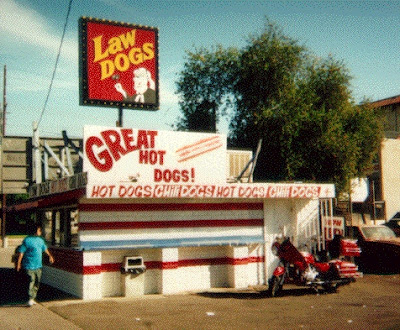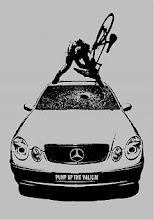

LAST STAND FOR THE FAR-LEFT
Berlin Commune Fights the Property Developers
By Stefan Berg and Marcel Rosenbach
The Köpi in Berlin is famous as one of the last remaining remnants of the city's squat culture from the early 1990s. The building, which is in a desirable location, has now been sold to a property developer -- but the residents aren't giving up without a fight.
The Köpi in Berlin's Mitte district is a symbol of the city's far-left scene.
Sabine Sauer / DER SPIEGEL
The Köpi in Berlin's Mitte district is a symbol of the city's far-left scene.
They sat down together just like every week, but this time the mood was different: nervous, tense, but also a bit agitated. "It was as if we had just survived a battle," said one of the people who attended the meeting two weekends ago.
The war comparison image is not that far-fetched. Nine cars and many trash containers had been set on fire in Berlin the night before. There had been an enormous police presence on the streets and more than 50 people were arrested. The tabloid Bild described it as an "anarchist war" right in the middle of Berlin's trendy Mitte district.
The demonstration -- the topic of discussion at the meeting the next day -- was about "autonomous free space." Its purpose was to protest against the victory march of capitalism ("Smash Capitalism" was one of the slogans) that is changing the face of the cash-strapped German capital -- slowly, but visibly, especially in the former East Berlin districts of Mitte and Prenzlauer Berg.
The location of the meeting was not without significance. The group had convened in the "Aquarium" meeting room in the building known as the Köpi, located at Köpenicker Strasse 137 in Berlin's Mitte district. The Köpi is one of the self-defined "free spaces" that the violent protests had been all about.
In 1990, it was one of the first buildings to be occupied by squatters in former East Berlin. Today, it is the most important radical left-wing residential project in the former city of squatters. The building has even been featured on postcards, thanks to a slogan painted in giant white letters on the outside wall: "There are no borders between peoples, only between the top and the bottom."
Architecturally speaking, the Köpi is the surviving rear section and two side wings of a typical Berlin residential building with inner courtyards from the beginning of the 20th century. From the outside, it is in terrible condition. Next to the main building, the Köpi also has a lot for trailer homes and tents.
But for residents and the large contingent of sympathizers with the radical left-wing movement, the Köpi is more than just a run-down old building. It is a symbol, a sort of last refuge for alternative lifestyles.
The Köpi is self-organizing and run on communal principles. The plenary session every Sunday is the main administrative body. Participation is strictly limited to Köpi residents and representatives of the many cultural projects and bars that have found a home in the commune. Outsiders are barred from the meeting and mobile phones are prohibited -- for fear of surveillance by the domestic intelligence agencies, which keep a close eye on far-left activities in Germany.
On the day after the demonstration, there was a roll call of sorts to see if any of the Köpi's residents had been among those arrested. It appeared that this was not the case, and the demonstration was chalked up as a success. The slogan "Köpi stays" featured on many of the placards the protestors were carrying, and a few young sympathizers had even dressed up as "Köpi Knights," complete with helmets and shields.
The Köpi slogan has never been more topical. Since the spring, defending free space has taken on a very concrete meaning, namely preventing forcible eviction. The Köpi and two adjacent properties were auctioned off in a forced sale in May, under dubious circumstances and to an even more dubious buyer.
Since then, officials at the State Office of Criminal Investigation (LKA) have observed increasing levels of violence within the Berlin anarchist community. During the course of the year, 111 cars -- from Minis to luxury sedans -- have been torched, many of them company cars owned by industrial giants like Siemens or the German national railway company Deutsche Bahn. The authorities are convinced the perpetrators were members of the radical left-wing community.
Since the night of rioting in Mitte, security officials in Berlin have issued dire warnings that the city could face the sort of violent unrest that plagued Copenhagen in December 2006 and March 2007 after police evicted the occupants of the Ungdomshuset left-wing youth center. Many members of Berlin's radical left-wing community who had traveled to Copenhagen were among those arrested. The demonstration two weekends ago was held on the one-year anniversary of the first Copenhagen riot.
The fear of violence erupting on a similar scale in Berlin is not unfounded. In the past few days, Berlin's left-wing radicals have invited like-minded groups from throughout Europe to come to the city. They plan to hold an action week and a street festival at the Köpi around May 31 of next year, the date the property is to be handed over to the new owner -- empty, clean and complete with all sets of keys.
In May 2007, the presumed investor appeared in public for the first time, coming to the administrative court in Mitte, right on time for the auction. A tall man with a noticeable gap in his front teeth, he arrived with bodyguards and introduced himself to the court clerk as Besnik Fichtner, managing director of a company with the futuristic-sounding name Plutonium 114.
Fichtner, a former floor tiler from Kosovo, seemed unimpressed by the catcalls and attempts to intimidate him by the roughly 70 Köpi residents who had managed to get into the courtroom. The property was eventually sold to the company Fichtner represents for €835,000. This is roughly half the property's market value -- in other words, a steal for Fichtner. He also bought the two adjacent properties for a total of €900,000.
The eviction notice that was recently posted on the bulletin board in the hallway at the Köpi makes no mention of Plutonium 114. Instead, the documents are signed by a company calling itself Joles GmbH, headquartered in Pristina, the capital of Kosovo. "Once all apartments currently occupied by tenants have been cleared," the eviction notice reads, the "construction work" will begin. Everyone knows that "construction work" in this case means only one thing: demolition.
From the standpoint of the radicals living there, the notice is nothing but a provocation and a declaration of war. They see it as a confirmation of the slogan on the building's wall, the slogan about class warfare; for them it's about anarchists versus speculators, and for them the rules of engagement are clear. Black banners now hang from the front of the main Köpi building, reading: "It'll be a hot winter" and "Köpi remains a risky investment."
Statements of support for the Köpi group have begun appearing throughout Germany, on signs at demonstrations, on the walls of buildings and on the Internet. Berlin's new Alexa shopping mall at Alexanderplatz had barely opened its doors before the first "Köpi stays" graffiti had appeared on the walls.
The Köpi residents are already getting organized ahead of the coming battle. One group is responsible for PR and dealing with the press, another is looking into the mysterious buyer and his backers, and a third manages the professionally designed website.
The attendees at a meeting in the "ACC," or "Antisocial Cultural Center," in the Köpi basement seem peaceful enough, even mild-mannered. Demian, a pleasant 29-year-old with a buzz cut, is a member of the PR committee. Of course, "Blase" ("Bubble") is there, a man who, with his flowing white hair and full beard, has the look of the chief of the Köpians and could easily be Demian's grandfather. Blase's real name is Peter Rösch. He was a courageous dissident in East Germany, and he has remained fundamentally true to his principles and his critical stance toward authority. He doesn't live in the building, but in a nearby former squat. He has made the Köpi his mission, and, unlike some others, he wants to see its problems resolved peacefully.
Standing at a counter in the windowless basement, Demian and Blase attempt to explain what it is they are fighting for, what the Köpi means to them. In addition to the "ACC," the building is home to "Koma F," a cocktail bar that is also used for concerts. There is a mattress-lined room with a climbing wall, a metalworking shop, a silkscreen-printing room and even a gym where the "Köpi Fight Club" practices martial arts.
In the former East Germany, the complex was home to a bowling club and ping-pong club, among other things. The slogan "Onward on the Road of Socialism" is still emblazoned above the door. From the perspective of Demian and Blase, the building has now truly become the property of the people. The Köpi PR man calls it a "utopian experience," an alternative form of cohabitation beyond the confines of the conventional family.
Blase has a significantly more political take on the situation. For many years, he fought his battles on behalf of the Köpi in round-table discussions with the district mayor and representatives of the Berlin Senate. In the upheaval of the early 1990s, Blase and his friends managed to convince the owners to sign leases with them, contracts which they insist are still valid. When an investor began building a nursing home directly adjacent to the Köpi's walls, which would have covered up the wall with the legendary top/bottom slogan, he was forced to agree to have the slogan painted onto the wall of the nursing home -- with sufficiently large letters.
Frank, whose hair is dyed peroxide-blonde, represents the Köpians' less moderate fighting contingent. He was one of a handful of original residents who selected the building after the fall of the Berlin Wall, and he remembers that Friday in February 1990 when he and the first squatters entered the building before the last tenants and sports clubs had even vacated the premises.
Frank was there when three mountain climbers rappelled from the side of the building and painted the famous slogan. The phrase was chosen by the plenary committee, which already existed at that time.
Frank became a father during his days living at the Köpi, and it was there that he celebrated his daughter's birthdays until she was 10. That was when he moved out, but he never left completely. Today Frank is the organization's chairman, is among its most loyal supporters and attends virtually every event.
There are several factions at the Köpi with varying positions on the question of violence. A strong faction believes that the Köpi has only survived as long as it has because its residents are considered unpredictable. The group has already issued an open threat on its Web site: "If Fichtner feels he needs to terminate the lease, then we will terminate the cease-fire."
This strategy has been sufficiently intimidating until now. According to officials at the Berlin Senate, there have been more than 50 inquiries from potential buyers of the property over the years. But all of them quickly reconsidered, and a number of scheduled auctions for the building were cancelled.
To nip these sorts of problems in the bud, the new owner opted for a more cunning approach. First he sent Besnik Fichtner and his intimidating bodyguards to Berlin. The legal correspondence came later, from Kosovo. He reasoned that perhaps ethnic Albanians from Kosovo could manage to drum some respect into the anarchists, and that intimidation is the best way to fight intimidation.
No one in the radical community believes that the Köpi was in fact sold to a buyer in Kosovo. In fact, Fichtner is merely a trustee. The real new owner has his offices only a few kilometers away, in an opulent building on one of the city's main shopping thoroughfares, the Kurfürstendamm. Siegfried Nehls, 43, who likes to put a "Dr." before his name, is an old hand in the Berlin real estate renovation business and operates a network of several interrelated companies.
Nehls and his partners underestimated the radical left-wing community. The Köpi residents hired an experienced attorney, Moritz Heusinger. Their research team obtained information about the Nehls empire from government offices and the courts and got hold of the relevant documents from the local corporate registry. It didn't take long before the identity of the real new owner was discovered.
Just one week after the auction, a group of Köpi residents showed up in the front yard of Nehls' parents' house in a Berlin suburb. Nehls' father was open to discussion and even invited the Köpi delegation into his house, but Siegfried's brother called the police. A few of the uninvited guests were charged with trespassing and were even arrested for a short time.
In addition to the squatters, investigators have their eye on the new owner of the building. Nehls has been peppered with lawsuits since the late 1990s -- from subcontractors and many buyers of his condominiums. According to the Berlin public prosecutor's office, several pending cases involving charges of fraud have now been put together. Nehls and his partners are accused of having defrauded construction companies of their revenues, a charge they deny.
One month after the Köpi auction, dozens of police officers raided Nehls' offices and his apartment. Fichtner's office and about 20 other apartments and offices were also searched.
Real estate developer Nehls is a giant of a man with a deep voice, and yet he prefers to respond to SPIEGEL's inquiries in writing. His statement comes from a company called Vitalis Beteiligungsgesellschaft für Altbauten mbH (Vitalis Holding Company for Old Buildings). Nehls is registered as the company's managing director. The letter explains, in smooth-talking real estate terms, that the company is interested in Köpenicker Strasse 137 because it is in "a highly appealing neighborhood" where properties, in the coming years, "will become increasingly attractive, in light of their charming potential for mixed-use residential and commercial development."
The letter also explains the reasoning behind the abstruse Plutonium-Joles-Vitalis purchasing setup: "From the standpoint of the State Office of Criminal Investigation, closing this center poses a not insignificant danger." Despite the fact that the sale was handled through the trustee, the letter continues, "our office, as well as employees and family members of the managing director, have received personal threats."
Vitalis also provides, for the first time, detailed information about its plans for the site: It intends to develop "approx. 150 apartments with almost 12,600 square meters (135,000 square feet) of living space," adding that it can be assumed "that it will not be possible to preserve the existing old buildings."
The man at the Berlin Senate who is responsible for managing such problematic cases is Ralf Hirsch. He is in charge of a project dubbed "Social City" -- and he comes across as somewhat helpless. Hirsch was caught unawares by the auction plans, just as the Köpi residents were. He invited Nehls and his attorneys to his office for a preliminary discussion, but he had little to offer as a mediator. "The only alternative," says Hirsch, "would have been for the state or the residents to purchase the property."
But Berlin is broke. The Senate's formerly deep pockets, into which it was able to reach to calm down the owners of more than 100 squatted buildings in the German capital by paying them subsidies, are now close to empty. Nevertheless, everyone involved senses that Berlin will be paying a high price for the controversy, one way or another. The policing costs are already in the hundreds of thousands of euros. If nothing else, there is one thing that Hirsch hopes to avoid if at all possible: individual evictions, which would take place apartment by apartment, tenant by tenant. "It would mean a state of permanent war," he says.
It's obvious that Hirsch doesn't even want to imagine the scenario. He represented the city during the long years of round table discussions with the Köpi, and he has a closer relationship with the residents than many would imagine. He knew Blase in the former East Germany, where both men were members of the dissident community.
"The truth is that everyone wants things to remain the way they are," says Hirsch. That may be the case for Demian, Blase and the other Köpi residents -- but it certainly does not apply to Nehls, the real estate developer.
Faced with the current stalemate, city officials nervously anticipate even more volatile times ahead. May 1 is normally considered a potentially explosive date -- far-left anarchists have a tradition of rioting in Berlin on that day. This year, many fear May 31 could also be a tad too lively for comfort: Inspired by current events, the Köpi cinema recently added a series of films about "liberation struggles" to its lineup.
Translated from the German by Christopher Sultan


